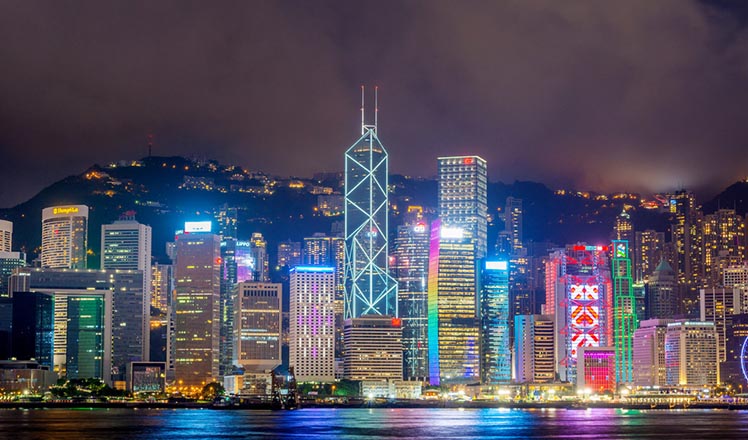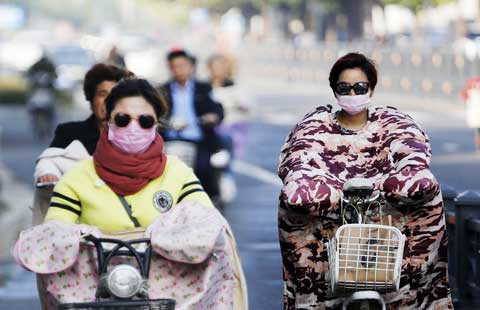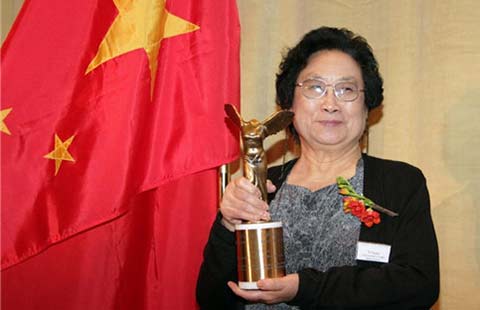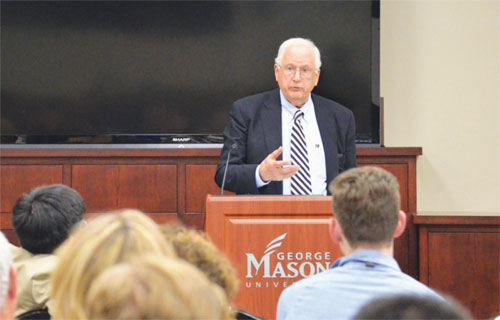Ambassador calls for the 'unconventional'
Updated: 2015-10-09 11:18
By Cai Chunying in Washington(China Daily USA)
|
||||||||
|
J. Stapelton Roy, former US ambassador to China, speaks with students and faculty at George Mason University on Monday evening after the live NCUSCR webcast. Cai Chunying / China Daily |
For one group of people who gathered to listen to the China Town Hall webcast from the National Committee on US-China Relations (NCUSCR) on Monday evening, the local China expert on hand to share his views after the webcast was about the best you can get.
J. Stapleton Roy, former US ambassador to China and three-time ambassador to Asia, spoke to a roomful of students and faculty members at George Mason University on the US-China relationship from his lifelong engagement with China.
Calling the NCUSCR's national program "instructive", Roy said one can easily tell how local and Congressional leaders differ from each other when it comes to Chinese investment.
In the webcast, a mayor from Alabama shared his story of attracting a Chinese company to set up a factory in his town, which generated 300 new jobs and gave new hope to an extremely poor community.
"People at the local level are concerned about jobs, community development and trying to keep the local economy moving along, while in Washington Congress is looking at foreign investment as a threat to the United States and often reacts instinctively in a negative way," said Roy, who spent his childhood in China with his missionary father and speaks fluent Mandarin.
"I have found that governors and mayors uniformly think of foreign investment as an enormous opportunity for the United States," he added.
For Roy, the "enormous opportunity" can also be applied to the US-China relationship, provided the leaders of the two countries take the right approach in handling it.
Roy said it is possible for the US and China to "create a new type of great power relationship that brings their strategic competition under control instead of going into conflict", but it requires "unconventional behavior" to avoid the trap that is the result of human nature's impulse to always try to counteract each other's perceived threats.
In Roy's view, President Richard Nixon's 1972 ice-breaking visit to China and Chinese President Deng Xiaoping's approach to China-Japan relations of setting aside territory disputes and concentrating on development are two good examples of the kind of "unconventional behavior" he's talking about.
"It requires courage, wisdom and foresight and these are qualities that many leaders do not have," said Roy, who was also the founding director of the Kissinger Institute on China and the United States at the Woodrow Wilson Center for International Scholars, a well-respected think tank in Washington.
He said the US is not set up politically now to allow those qualities to work.
"The United States is the only country that does not need to worry about China's success, but the premise has to be the United States has to domestically work together", said Roy, who holds the rank of career ambassador, the highest rank in the United States Foreign Service.
"When the US is so determined to keep its military strong, the rest of the government will be underfunded and loses other tools of diplomacy that are necessary to enhance its position in the world."
Roy also reflected on the future of China because "it is a key element shaping the US-China relationship."
Roy said even though China experts in the US constantly debate "whether China is heading toward world dominance or collapse", they should not be worried about China's future.
"Not because it is not relevant to us", said Roy, but "because China's future lies in the hands of the Chinese people, not in the hands of the American people."
He said China is "too big, too proud, too nationalistic to let its future be determined by one or two foreign countries, no matter how powerful they are."
Calling the idea of China having a secrete plan to dominate the world "nonsense", Roy said, "during the entire period of reform and openness, China has had a succession of sober-minded leaders whose goals have been to raise the standard of living and modernize their country, not to grasp for world or even regional domination".
Roy said although China is facing tremendous domestic problems, such as "pervasive corruption", "life-threatening air and water pollution", "politically-relevant extremes in wealth distribution", and "a middle-income trap which is losing low-income labor", Chinese leaders are making constant efforts to try to implement economic reforms and change the way the economy functions in order to keep the country competitive in the global economy.
"Competent leaders can keep those types of problems manageable if they deal with them," said Roy. "And this is exactly what the Chinese leaders are doing."
charlenecai@chinadailyusa.com

 Top 10 most competitive economies
Top 10 most competitive economies
 Cold wave sweeps through China
Cold wave sweeps through China
 Taking a peek
Taking a peek
 News you don't wanna miss over the National Day holiday
News you don't wanna miss over the National Day holiday
 TCM knacks to fight post-holiday syndrome
TCM knacks to fight post-holiday syndrome
 Zhang Lei wins fourth season of Voice of China
Zhang Lei wins fourth season of Voice of China
 Travel rush around China as National Day holidays end
Travel rush around China as National Day holidays end-
 Rising yuan use may lift IMF basket prospects
Rising yuan use may lift IMF basket prospects
Most Viewed
Editor's Picks

|

|

|

|

|

|
Today's Top News
Tu first Chinese to win Nobel Prize in Medicine
Huntsman says Sino-US relationship needs common goals
Xi pledges $2 billion to help developing countries
Young people from US look forward to Xi's state visit: Survey
US to accept more refugees than planned
Li calls on State-owned firms to tap more global markets
Apple's iOS App Store suffers first major attack
Japan enacts new security laws to overturn postwar pacifism
US Weekly

|

|








